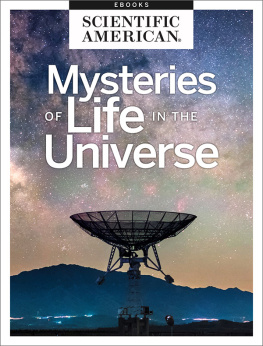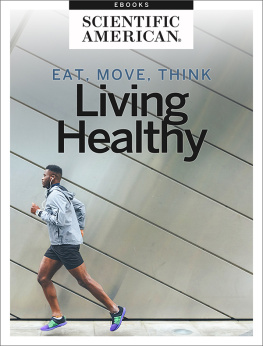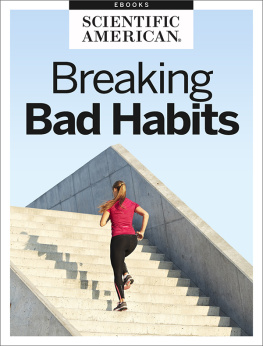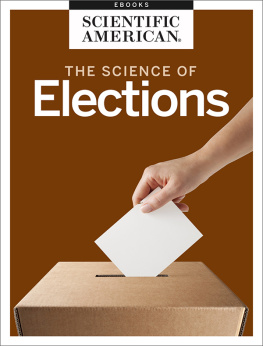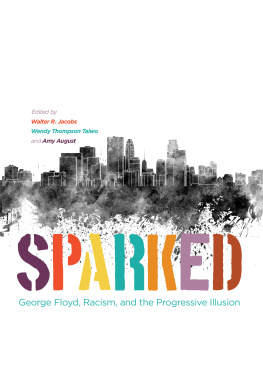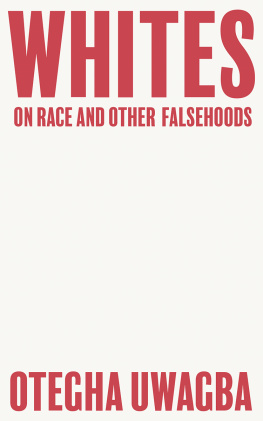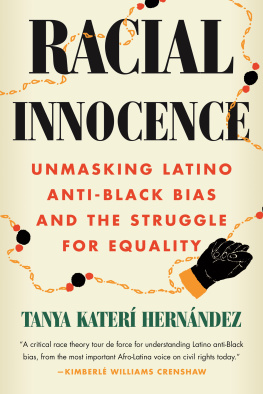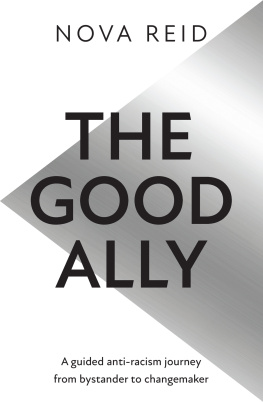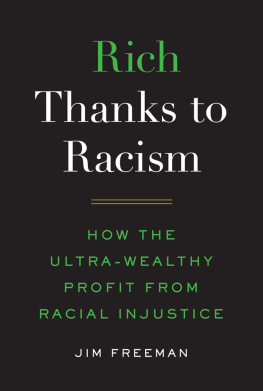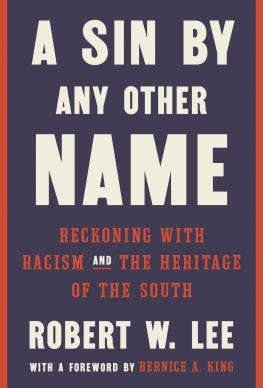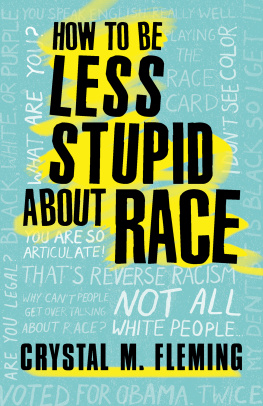Racism
Confronting Injustice, Bias and Inequality
From the Editors of Scientific American
Cover Image: CoffeeAndMilk/GettyImages
Letters to the Editor
Scientific American
One New York Plaza
Suite 4500
New York, NY 10004-1562
or editors@sciam.com
Copyright 2021 Scientific American, a division of Springer Nature America, Inc.
All rights reserved.
Published by Scientific American
www.scientificamerican.com
ISBN: 978-1-948933-25-4


RACISM
From the Editors of Scientific American
Table of Contents
Introduction
by Lisa Pallatroni
Section 1
1.1
by Jen Schwartz & Dan Schlenoff
1.2
by 500 Women Scientists Leadership
Section 2
2.1
by Siri Carpenter
2.2
by Keith Payne, Laura Niemi & John M. Doris
2.3
by Mina Cikara & Jay Van Bavel
Section 3
3.1
by Janet Currie
3.2
by Rachel Pearson
3.3
by Yoshiko Iwai
3.4
by Obasi Okorie, Ekemini Hogan & Utibe Effiong
3.5
by Ann Crawford-Roberts, Sonya Shadravan, Jennifer Tsai, Nicols E. Barcel, Allie Gips, Michael Mensah, Nichole Roxas, Alina Kung, Anna Darby, Naya Misa, Isabella Morton & Alice Shen
3.6
by Claudia Wallis & Camara Phyllis Jones
3.7
by Jennifer Tsai
3.8
by Uch Blackstock
3.9
by Sabrina Strings & Lindo Bacon
3.10
by Janice Phillips
Section 4
4.1
by Andrea Thompson
4.2
by Robin Lloyd & Steve Mirsky
4.3
by Jeremy Hsu
Section 5
5.1
by Andrei Cimpian & Sarah-Jane Leslie
5.2
by Amanda Montaez
5.3
by Erika Jefferson
5.4
by Ayana Elizabeth Johnson
Section 6
6.1
by Starre Vartan
6.2
by Sophie Bushwick & Craig Watson
6.3
by Theodore Kim
6.4
by Ainissa G. Ramirez
Section 7
7.1
by The Editors
7.2
by Lydia Denworth & Alexis J. Hoag
7.3
by Rachel Nuwer
7.4
by Dina Fine Maron & Jack Glaser
7.5
by Stacey McKenna
Section 8
8.1
by Victoria Plaut
8.2
by Katherine W. Phillips
8.3
by Aldon Morris
8.4
by C. Brandon Ogbunu
The Work Is Just Beginning
The murder of George Floyd in May 2020 brought fierce and renewed tensions to issues of anti-Black racism and police violence in the US. Not a new movement, Black Lives Matter began as a call to action in response to police violence, founded in 2013 after the acquittal of Trayvon Martins murderer. The outcry and eruption of protests following Floyds killing led to a long-overdue reckoning across industries, in politics and in society to confront white supremacy and racial injustice.
For Scientific American, part of this reckoning is to look in the mirror at our coverage and to make a commitment to improved and wider reporting of racism and anti-Blackness and to elevate Black and Brown voices. This is an ongoing process, and here weve gathered some of our most important coverage to date, starting with an examination of the history of science and the harm its caused, including our own. In Reckoning with Our Mistakes, Jen Schwartz and Dan Schlenoff assess some of the most cringe-inducing articles in our archive and what they say about the misuse of scientific authority.
As happened with George Floyds murder and the need for police reform, COVID-19 exposed the health inequality that Black Americans face to mainstream white America. Nationwide, at the time of this publication, Black people have died at 1.5 times the rate of white people. In an interview with Claudia Wallis, Camara Phyllis Jones explains how systemic racism leads people of color to be more exposed and less protected than white people. Jennifer Tsai examines the consequences of overt racism, including false claims by a (former!) president blaming China for the pandemic, which led to threats and violence against Asian-Americans.
Health inequality begins before birth, as Janet Currie discusses. Poor nutrition, smoking and other risk factors linked to poverty can predispose babies to future diseases, and minorities are more likely to face these risk factors. Andrea Thompson examines racial disparities in exposure to air pollution, putting minorities at greater risk for heart and lung diseases such as asthma. In I Cant Breathe: Asthma, Black Men and Police, Obasi Okorie and colleagues look at the death of Eric Gardner, who was choked by police with enough force to trigger a fatal asthma attack. The authors hypothesize that, in addition to skin color, asthma is a risk factor to dying in police custody, and police must embrace better tactics in apprehending and restraining suspects.
While better tactics are important, measures such as de-escalation training are not enough. As Stacey McKenna writes, any reform that seeks to reduce violence without addressing the root cause of racism is often more of a political tool than a sincere attempt to change the system. In Three Ways to Fix Toxic Policing, our Editors discuss some of the steps needed for reform, including accountability and addressing the militarization of police force. Drawing from the Civil Rights Movement, Aldon Morris says that structural change requires widespread and sustained disruption. Morris uses example of the 1963 Birmingham campaign, where the ongoing demonstrations brought the city to a halt and negotiators to the table.
Repairing our broken institutions will come at a cost, whether were discussing our police force, education system or scientific community. In For Scientific Institutions, Racial Reconciliation Requires Reparations, C. Brandon Ogbunu uses the concept of reparations not in terms of a monetary debt to be repaid to Black scientists but in terms of the cost of rebuilding. Repairing racism in science must address practices to improve the professional experience of Black scientists, which includes rethinking of the institution of prestige, norms of collaboration, authorship/publishing and the process of promotion.
We hope that you will read these selections and our continued coverage of these issues and use this information to help you confront racism wherever it lives, including our own internal biases. The killing of George Floyd and the disproportionate effects of COVID-19 were catalysts, and should be a wake-up call for the white community. Participating in a Black Lives Matter march or contributing money to Black causes and political campaigns is the beginning. The real work has just begun.
-- Lisa Pallatroni
Book Editor
Reckoning with Our Mistakes
by Jen Schwartz & Dan Schlenoff
An article about women engineers, published in 1908, has a promising start: If women are attending technical schools and are not legally blocked from working in a forge or firm, why do they face so many obstacles to employment? A reader in 2020 who discovers such a socially progressive question in the archives of Scientific American anticipates a discussion of sex discrimination. Perhaps women such as Emily Warren Roebling, who took over her husbands role as chief engineer on construction of the Brooklyn Bridge after he became bedridden, will be held up for their contributions to the field. Surely the article will feature the voice of Nora Stanton Barney, who had recently fought to become the first woman accepted as a junior member in the American Society of Civil Engineers and was active in the suffrage movement


